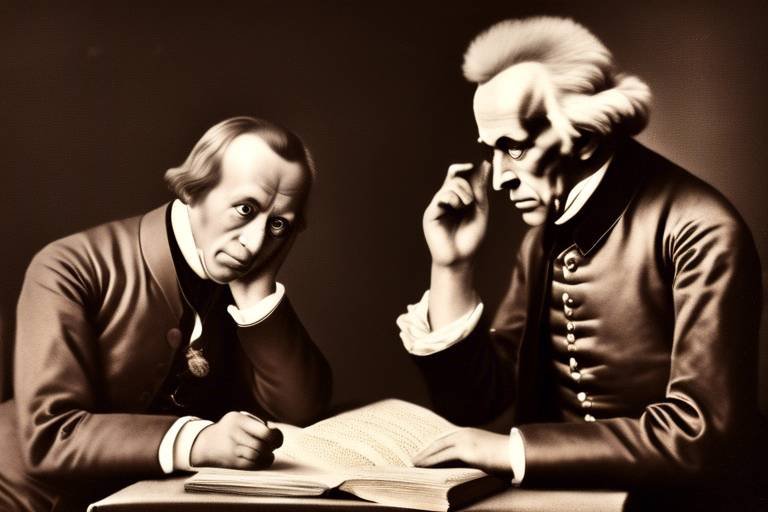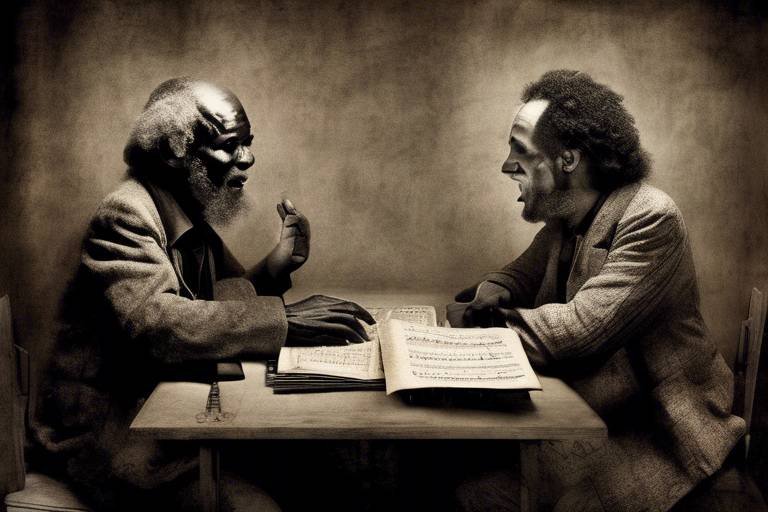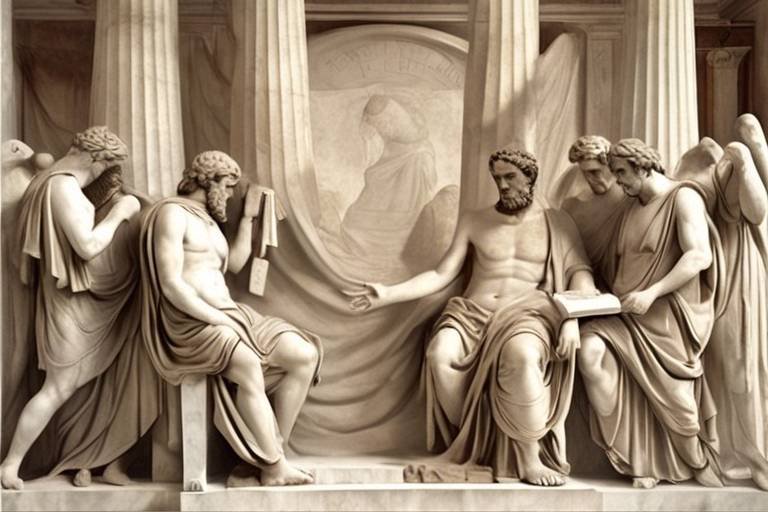Philosophy and Gender - A Detailed Review
The intricate relationship between philosophy and gender is a fascinating topic that invites us to explore how our understanding of identity shapes our thoughts and beliefs. Philosophy, traditionally dominated by male voices, is undergoing a significant transformation as gender perspectives are woven into its fabric. This article aims to delve into key theories, influential philosophers, and the profound impact that gender perspectives have on philosophical discourse. By examining the evolution of thought regarding gender, we can better understand the complexities of identity and the philosophical implications that arise from them.
Throughout history, the perception and representation of gender in philosophy have undergone remarkable shifts. From the ancient Greeks, who often relegated women to the background, to the Enlightenment thinkers who began to question traditional gender roles, the journey has been anything but straightforward. Significant milestones include the emergence of feminist philosophy in the 20th century, which challenged the male-centric narratives that dominated philosophical discussions. This evolution reflects broader societal changes and highlights the ongoing struggle for gender equality. As we explore this historical context, we can identify key moments that have shaped the discourse around gender in philosophy.
In the landscape of philosophical thought, certain figures have made indelible marks on gender discourse. Their contributions have not only enriched our understanding of gender but have also paved the way for contemporary discussions. For instance, philosophers like Simone de Beauvoir, Judith Butler, and bell hooks have each brought unique perspectives to the table. Their works challenge traditional notions of gender and encourage us to rethink our assumptions about identity and representation. In this section, we will delve into the ideas of these prominent thinkers and analyze the implications of their philosophies on modern thought.
Simone de Beauvoir's seminal work, The Second Sex, stands as a cornerstone of feminist philosophy. In this groundbreaking text, de Beauvoir famously declared, "One is not born, but rather becomes, a woman." This powerful assertion underscores the idea that gender is not a fixed biological trait but a social construct shaped by cultural norms and expectations. Her exploration of existentialism and feminism provides a framework for understanding women's experiences in a patriarchal society. By highlighting the ways in which women have been historically oppressed, de Beauvoir's influence continues to resonate in contemporary feminist thought.
The intersection of existentialism and feminism offers profound insights into the complexities of women's experiences. Existentialist ideas emphasize personal freedom and responsibility, which empower individuals to define their own identities. For women, this perspective can be liberating, as it challenges traditional roles and encourages self-discovery. In a world that often imposes rigid definitions of gender, existentialism provides a lens through which women can reclaim their narratives and assert their autonomy. This philosophical framework has become essential in understanding the ongoing struggles for gender equality.
While de Beauvoir's contributions are monumental, her theories have not gone unchallenged. Later feminist philosophers have critiqued her ideas, arguing that they may not fully encompass the diverse experiences of all women. For example, some have pointed out that de Beauvoir's focus on the experiences of white, middle-class women overlooks the realities faced by women of color and those from different socioeconomic backgrounds. These critiques have sparked ongoing debates within gender philosophy, emphasizing the need for a more inclusive approach that considers intersectionality and the multiplicity of identities.
Intersectionality is a concept that enriches philosophical discussions by incorporating multiple identities and experiences into gender analysis. Coined by Kimberlé Crenshaw, intersectionality challenges the notion of a singular experience of gender, highlighting how factors like race, class, and sexuality intersect to shape individual realities. This framework is crucial for understanding the complexities of identity in a globalized world. By recognizing that individuals exist at the crossroads of various social categories, philosophers can engage in more nuanced discussions that reflect the diversity of human experiences.
Modern gender theories, such as queer theory and trans studies, have significantly contributed to philosophical discussions around identity and representation. These theories challenge traditional notions of gender and sexuality, advocating for a more fluid understanding of identity. Queer theory, for instance, interrogates the binary classifications of gender and encourages a rethinking of sexual norms. Trans philosophy, on the other hand, focuses on the experiences of transgender individuals, emphasizing the importance of recognition and validation in the quest for identity. Together, these contemporary theories push the boundaries of philosophical thought and invite us to reconsider our understanding of gender.
Queer theory has its philosophical roots in the works of thinkers like Michel Foucault and Judith Butler, who challenge the traditional categorizations of gender and sexuality. By deconstructing the norms that dictate acceptable expressions of identity, queer theory opens up a space for diverse experiences and perspectives. This radical approach not only questions the binary understanding of gender but also critiques the societal structures that uphold these binaries. As a result, queer theory has become a vital part of contemporary philosophical discourse, encouraging a more inclusive and expansive understanding of identity.
The emerging field of trans philosophy focuses on the complexities of identity, recognition, and the implications for understanding gender in a broader context. This area of study emphasizes the importance of validating trans experiences and challenging the societal norms that often marginalize these identities. By exploring the philosophical underpinnings of gender transition, trans philosophy invites us to rethink our assumptions about identity, encouraging a more compassionate and inclusive approach to understanding the diverse spectrum of human experience.
- What is the significance of gender in philosophical discourse?
Gender plays a crucial role in shaping philosophical thought, influencing discussions on identity, ethics, and social justice. - How have feminist philosophers contributed to our understanding of gender?
Feminist philosophers have challenged traditional narratives, emphasizing the importance of women's experiences and advocating for gender equality. - What is intersectionality, and why is it important?
Intersectionality recognizes that individuals experience multiple identities simultaneously, enriching discussions around gender by considering diverse perspectives.

The Historical Context of Gender in Philosophy
The relationship between gender and philosophy has evolved dramatically over the centuries, reflecting broader societal changes and the shifting tides of intellectual thought. Historically, philosophy was predominantly a male-dominated field, with many influential thinkers often sidelining or completely ignoring women's perspectives. This oversight not only shaped the discipline but also contributed to a skewed understanding of human experience. In ancient times, philosophers like Plato and Aristotle laid the groundwork for Western philosophical thought, but their views on women were largely restrictive. For instance, Aristotle famously described women as "natural misfits," a notion that echoed through the ages and influenced how women were perceived in both philosophical and societal contexts.
As we move through the Middle Ages and into the Enlightenment, we see a gradual, albeit slow, recognition of women's intellectual contributions. Thinkers such as Mary Wollstonecraft began to challenge the status quo, advocating for women's education and rights. Her seminal work, A Vindication of the Rights of Woman, marked a pivotal moment in gender philosophy, arguing that women are not inferior to men but rather are denied the same opportunities for education and personal development. This was a radical departure from the traditional views held by many philosophers of her time and laid the groundwork for future feminist thought.
The 19th and 20th centuries witnessed significant milestones in the intersection of gender and philosophy. The emergence of feminist philosophy, spearheaded by figures like Simone de Beauvoir, brought forth a critical examination of the social constructs surrounding gender. De Beauvoir's influential work, The Second Sex, interrogated the ways in which women have been historically defined in relation to men, famously declaring that "one is not born, but rather becomes, a woman." This assertion opened the floodgates for discussions about gender as a social construct, challenging essentialist views that had long dominated philosophical discourse.
In addition to de Beauvoir, other philosophers began to explore the implications of gender in their work. The concept of intersectionality, introduced by Kimberlé Crenshaw, further enriched gender philosophy by emphasizing the interconnectedness of various social identities, including race, class, and sexuality. This framework encouraged a more nuanced understanding of how different forms of oppression interact, pushing philosophers to consider a wider array of experiences in their analyses.
The historical context of gender in philosophy is not merely a timeline of events; it is a tapestry woven with the threads of struggle, resistance, and transformation. Each philosopher, each theory, and each critique has contributed to a richer understanding of gender, challenging the philosophical canon to be more inclusive. Today, the dialogue continues to evolve, as contemporary thinkers build on the foundations laid by their predecessors and push the boundaries of what gender means in philosophical discourse.
To encapsulate the evolution of gender in philosophy, the following table highlights key milestones and figures that have shaped this discourse over the centuries:
| Time Period | Key Figures | Significant Contributions |
|---|---|---|
| Ancient Greece | Plato, Aristotle | Foundation of Western philosophy, gendered views on women |
| 18th Century | Mary Wollstonecraft | Advocated for women's education and rights |
| 20th Century | Simone de Beauvoir | Introduced the idea of gender as a social construct |
| Late 20th Century | Kimberlé Crenshaw | Developed the concept of intersectionality |
In conclusion, the historical context of gender in philosophy reveals a complex interplay of ideas, challenges, and transformations. As we delve deeper into this discourse, it becomes increasingly clear that understanding gender is crucial for grasping the broader philosophical landscape. The journey is ongoing, and the contributions of diverse voices continue to reshape our understanding of both philosophy and gender.
- What is the significance of gender in philosophy? Gender plays a crucial role in shaping philosophical thought, influencing how concepts of identity, morality, and human experience are understood.
- Who are some key figures in feminist philosophy? Notable figures include Mary Wollstonecraft, Simone de Beauvoir, Judith Butler, and Kimberlé Crenshaw, each contributing significantly to the discourse on gender.
- How has intersectionality changed the conversation around gender? Intersectionality has introduced a more nuanced understanding of how various identities intersect, leading to richer discussions about oppression and privilege.

Key Philosophers and Their Contributions
The exploration of gender in philosophy is a rich tapestry woven by the thoughts and ideas of numerous influential philosophers. These thinkers have not only shaped the discourse around gender but have also challenged the very foundations of traditional philosophical thought. Their contributions have paved the way for a deeper understanding of gender dynamics and have opened up new avenues for inquiry. Let’s take a closer look at some of these key figures and the impact they’ve had on the field.
One cannot discuss gender philosophy without mentioning Simone de Beauvoir. Her groundbreaking work, The Second Sex, published in 1949, is often regarded as a cornerstone of feminist philosophy. In this text, Beauvoir famously declared that "one is not born, but rather becomes, a woman," suggesting that gender is not an innate quality but a social construct. This revolutionary idea challenged the established norms of her time and laid the groundwork for feminist existentialism. Beauvoir’s analysis of women’s oppression and her call for women to assert their freedom and autonomy have resonated through generations, inspiring countless feminist movements around the globe.
Another pivotal figure is Judith Butler, whose work in the late 20th century further expanded the conversation on gender. Butler’s concept of gender performativity posits that gender is not a static identity but rather an ongoing performance shaped by societal expectations. This idea has not only influenced feminist theory but has also provided a critical framework for understanding the fluidity of gender identity. Butler's works, such as Gender Trouble, challenge the binary notions of gender and invite us to question the roles we play in our daily lives.
Additionally, the contributions of bell hooks cannot be overlooked. In her extensive body of work, hooks addresses the intersections of race, class, and gender, advocating for a more inclusive feminist discourse. She emphasizes the importance of recognizing how various forms of oppression are interconnected, which has led to a broader understanding of feminism that includes the voices and experiences of marginalized groups. Her call for “feminism for everybody” has made feminist theory accessible and relevant to a wider audience, thus enriching the philosophical landscape.
Moreover, the concept of intersectionality, introduced by Kimberlé Crenshaw, has transformed the way we think about gender. Intersectionality examines how different aspects of a person’s identity—such as race, class, and gender—interact to create unique experiences of oppression and privilege. This framework has been instrumental in expanding feminist discourse to include diverse perspectives, allowing for a more nuanced understanding of how various identities affect individuals' experiences in society. Crenshaw’s work has sparked important discussions around inclusivity in feminist movements and has encouraged philosophers to consider multiple identities when analyzing gender.
In summary, the contributions of these philosophers have significantly shaped the discourse on gender. Their ideas challenge us to think critically about the constructs of gender and encourage a more inclusive approach to philosophical inquiry. As we continue to explore the complexities of gender, the foundational work laid by these thinkers remains essential in guiding contemporary discussions.
- What is the significance of Simone de Beauvoir's work? Beauvoir's work highlighted the social construction of gender and called for women's liberation, influencing feminist thought significantly.
- How does Judith Butler's concept of gender performativity change our understanding of gender? Butler's idea suggests that gender is not fixed but is performed based on societal norms, challenging traditional binary views.
- What is intersectionality and why is it important? Intersectionality considers how various identities intersect to create unique experiences of oppression, making feminist discourse more inclusive.

Simone de Beauvoir's Influence
When we talk about the intersection of philosophy and gender, it's impossible to overlook Simone de Beauvoir. Her groundbreaking work, The Second Sex, published in 1949, is often hailed as a foundational text in feminist philosophy. De Beauvoir didn’t just analyze the condition of women; she challenged the very fabric of societal norms that dictated gender roles. She famously stated, “One is not born, but rather becomes, a woman.” This assertion underlines the idea that gender is not a biological destiny but a social construct, a notion that has sparked countless discussions and debates.
De Beauvoir’s existentialist framework provides a lens through which we can examine the lived experiences of women in a patriarchal society. By applying existentialist principles, she emphasizes the importance of individual freedom and choice, arguing that women must transcend their societal limitations. This perspective resonates deeply in contemporary discussions about identity and agency, making her ideas remarkably relevant even today.
However, de Beauvoir's influence extends beyond her own writings. She has inspired a multitude of feminist theorists and movements, each interpreting her work through their unique lenses. For instance, the notion of otherness that she articulates has been pivotal in understanding the dynamics of power and oppression in gender relations. This concept posits that women have historically been positioned as the “Other” in relation to men, which has profound implications for how we understand gender identity and roles.
Yet, it’s essential to recognize that de Beauvoir's ideas have not gone unchallenged. Many later feminist philosophers have critiqued her work, arguing that it may not fully account for the experiences of women of different races, classes, and sexual orientations. This critique has led to a richer, more nuanced understanding of gender that incorporates intersectionality, allowing for a more comprehensive analysis of identity.
In summary, Simone de Beauvoir's influence on gender philosophy is monumental. She not only opened the door for feminist thought but also laid the groundwork for future discussions about identity, freedom, and the role of women in society. Through her existentialist lens, she encourages us to question the status quo and to strive for a world where gender is not a limiting factor in our pursuit of existence.
- What is the main argument of The Second Sex?
De Beauvoir argues that gender is a social construct rather than a biological fact, emphasizing that women have been historically defined as the “Other” in relation to men. - How did de Beauvoir influence feminist philosophy?
Her work laid the foundation for feminist theory, encouraging women to seek autonomy and challenge societal norms. - What critiques have been made of de Beauvoir's theories?
Later feminist philosophers have critiqued her for not fully addressing the experiences of women from diverse backgrounds, leading to the development of intersectional feminism.

The Second Sex,
Throughout history, the perception of gender in philosophy has evolved dramatically. From ancient times, where women were often excluded from intellectual discourse, to the modern era that celebrates diverse voices, the journey has been tumultuous yet enlightening. The philosophical landscape has seen significant milestones, such as the emergence of feminist thought in the 19th century, which challenged the patriarchal norms that dominated philosophical inquiry. This shift has opened doors for discussions around gender, identity, and representation, making it crucial to understand how these themes have developed over time.
Several philosophers have made significant contributions to the discourse on gender, shaping our understanding of identity and societal roles. Their ideas have not only influenced feminist philosophy but have also sparked debates that continue to resonate today. Among these thinkers, Simone de Beauvoir stands out as a pivotal figure. Her work has laid the groundwork for contemporary feminist thought, urging society to reconsider the constructs of gender and the implications of being categorized as "the Other."
Simone de Beauvoir's seminal work, The Second Sex, published in 1949, is often regarded as a cornerstone of feminist philosophy. In this groundbreaking text, de Beauvoir famously declares, "One is not born, but rather becomes, a woman." This assertion challenges the traditional notion of gender as a fixed biological category, arguing instead that it is a socially constructed identity shaped by cultural and historical contexts. Through her exploration of women's oppression, de Beauvoir illuminates the ways in which societal norms dictate the roles and expectations placed upon women.
De Beauvoir's existentialist framework serves as a powerful lens through which to understand women's experiences in a patriarchal society. By applying existentialist concepts such as freedom, choice, and authenticity, she posits that women must navigate a world that often seeks to define them in relation to men. This intersection of existentialism and feminism not only empowers women to reclaim their identities but also invites a broader examination of how societal structures limit individual potential. The existentialist call for authenticity resonates deeply with feminist ideals, urging women to assert their existence and agency in a world that frequently marginalizes them.
Despite the profound impact of The Second Sex, de Beauvoir's theories have not escaped critique. Later feminist philosophers have raised questions about her emphasis on existential freedom, arguing that it may overlook the complexities of race, class, and sexuality. These critiques have sparked ongoing debates within gender philosophy, highlighting the necessity of a more inclusive approach that considers the diverse experiences of all women. The dialogue surrounding de Beauvoir's work continues to evolve, reflecting the dynamic nature of feminist thought and its ability to adapt to contemporary challenges.
As discussions around gender philosophy have progressed, the concept of intersectionality has emerged as a vital framework. Coined by legal scholar Kimberlé Crenshaw, intersectionality recognizes that individuals experience oppression in varying degrees based on their multiple identities, including race, gender, sexuality, and class. This perspective enriches philosophical discussions by incorporating a more nuanced understanding of how these identities interact and shape experiences. By acknowledging intersectionality, philosophers can better address the complexities of gender and its implications in a diverse society.
In recent years, modern gender theories, including queer theory and trans studies, have gained prominence in philosophical discussions. These frameworks challenge traditional notions of gender and sexuality, offering fresh perspectives on identity and representation. They invite us to question the binaries that have long dominated our understanding of gender, encouraging a more fluid and inclusive approach to identity.
Queer theory, with its philosophical foundations rooted in post-structuralism, critiques the rigid categories of gender and sexuality that have historically defined societal norms. By deconstructing these categories, queer theorists advocate for a more expansive understanding of identity that embraces fluidity and multiplicity. This approach not only challenges heteronormativity but also encourages individuals to explore their identities beyond conventional labels.
The emerging field of trans philosophy further expands our understanding of gender by focusing on identity, recognition, and the complexities of transitioning. It emphasizes the importance of self-identification and the need for societal acknowledgment of diverse gender identities. By exploring the implications of trans experiences, philosophers can engage in deeper discussions about what it means to be human in a world that often seeks to categorize and limit.
- What is the main thesis of Simone de Beauvoir's The Second Sex?
De Beauvoir argues that gender is a social construct and that women are often defined as "the Other" in relation to men. - How does intersectionality relate to gender philosophy?
Intersectionality examines how various identities intersect to create unique experiences of oppression and privilege, enriching gender analysis. - What is the significance of queer theory in contemporary discussions of gender?
Queer theory challenges traditional gender binaries and encourages a more fluid understanding of identity, promoting inclusivity.

and its lasting impact on feminist philosophy and gender studies.
This article explores the intricate relationship between philosophy and gender, examining key theories, influential philosophers, and the impact of gender perspectives on philosophical discourse.
An overview of how gender has been perceived and represented throughout the history of philosophy, highlighting significant milestones and shifts in thought.
This section delves into the works of prominent philosophers who have shaped gender discourse, analyzing their ideas and the implications for contemporary thought.
Simone de Beauvoir's seminal work, The Second Sex, published in 1949, is often hailed as a cornerstone of feminist philosophy and gender studies. In this groundbreaking text, Beauvoir famously declared, “One is not born, but rather becomes, a woman.” This statement encapsulates her argument that gender is not a mere biological fact but a complex social construct shaped by cultural narratives and historical contexts. Her work challenged the traditional roles assigned to women and illuminated the pervasive nature of patriarchy in society.
The impact of Beauvoir's ideas extends far beyond her own time, influencing generations of feminist thinkers and activists. Her exploration of women's oppression, the concept of "the Other," and the existentialist framework she employed to analyze women's experiences have paved the way for critical discussions about identity, autonomy, and freedom. In essence, Beauvoir's work serves as both a mirror reflecting societal injustices and a lens through which to envision a more equitable future.
By intertwining existentialist philosophy with feminist theory, Beauvoir provided a unique framework for understanding women's experiences in a patriarchal society. Existentialism emphasizes individual freedom, choice, and the responsibility that comes with it. Beauvoir argued that women must transcend the limitations imposed by society to forge their own identities. This notion resonates deeply in contemporary feminist discourse, where the emphasis on agency and self-determination remains paramount.
Furthermore, her existentialist approach encourages women to confront the absurdities of their existence, challenging them to create meaning in a world that often seeks to define them solely in relation to men. This existentialist lens has inspired numerous feminist movements and theories, fostering a spirit of resistance and empowerment among women striving for equality.
While Beauvoir's contributions are undeniably significant, her theories have not escaped scrutiny. Later feminist philosophers have critiqued various aspects of her work, arguing that it may inadvertently reinforce binary gender distinctions or overlook the experiences of women of color, working-class women, and those from different cultural backgrounds. For instance, scholars such as bell hooks and Judith Butler have expanded upon Beauvoir's ideas, introducing intersectionality and the fluidity of gender as essential components of feminist thought.
These critiques have sparked ongoing debates within gender philosophy, prompting a reevaluation of Beauvoir's ideas in light of contemporary issues surrounding race, class, and sexuality. As a result, Beauvoir's work continues to be a touchstone for discussions about the complexities of gender and the necessity of incorporating diverse perspectives into feminist discourse.
A look at how intersectionality, as a concept, enriches philosophical discussions by incorporating multiple identities and experiences into gender analysis.
An examination of modern gender theories, including queer theory and trans studies, and their contributions to philosophical discussions around identity and representation.
Analyzing the philosophical foundations of queer theory and its challenge to traditional notions of gender and sexuality.
Exploring the emerging field of trans philosophy, focusing on identity, recognition, and the implications for understanding gender in a broader context.
- What is the main thesis of Simone de Beauvoir's The Second Sex?
The main thesis argues that gender is a social construct and that women have been historically oppressed by patriarchal structures.
- How has Beauvoir influenced modern feminism?
Her ideas on autonomy, identity, and the notion of "the Other" have become foundational in feminist theory, inspiring various movements and discussions.
- What critiques have been made against Beauvoir's work?
Critiques often focus on her perceived reinforcement of binary gender distinctions and the lack of attention to the experiences of marginalized women.

Existentialism and Feminism
When we think about existentialism and its ties to feminism, it's like peeling back the layers of an onion—each layer revealing deeper insights into the human condition, particularly from a woman's perspective. Existentialism, a philosophical movement that emphasizes individual existence, freedom, and choice, provides a rich framework for understanding the complexities of women's experiences in a world often dominated by patriarchal structures. At its core, existentialism challenges us to confront the absurdity of life and the inherent freedom that comes with it. This is where feminism steps in, advocating for the recognition and validation of women's voices and experiences.
One of the most significant contributions of existentialism to feminism is the idea of authenticity. For existentialists like Jean-Paul Sartre, authenticity involves embracing one's freedom and making choices based on personal values rather than societal expectations. This concept resonates deeply with feminist thought, which urges women to break free from traditional roles and assert their identities. Women, historically relegated to the background, are encouraged to step into the spotlight and define themselves on their own terms. But how does this play out in real life? It’s about recognizing that every woman has the power to shape her destiny, regardless of societal constraints.
Simone de Beauvoir, one of the foremost figures in both existentialism and feminism, famously stated, “One is not born, but rather becomes, a woman.” This profound assertion encapsulates the existentialist belief that identity is not predetermined but is a product of choices and experiences. In her seminal work, The Second Sex, de Beauvoir explores the ways in which women have been historically defined by their relationships to men, rather than as independent beings. She challenges the notion of femininity as a fixed essence, arguing instead that it is a construct shaped by culture and society. This perspective invites us to reconsider the very foundations of gender identity and the roles we inhabit.
However, the intersection of existentialism and feminism is not without its critiques. Some feminist philosophers argue that existentialism, while empowering, can sometimes overlook the social realities that women face. For instance, while existentialism promotes individual freedom, it may inadvertently ignore the systemic barriers that limit that freedom for many women. The challenge, then, is to balance the existential focus on individual agency with an awareness of the broader social structures that impact women's lives. This ongoing dialogue is crucial for the evolution of feminist thought and its integration with existentialist principles.
In essence, the relationship between existentialism and feminism is a dynamic interplay of ideas that encourages women to embrace their freedom, challenge societal norms, and forge their own paths. It’s a call to action, urging women to step into their power and to recognize that their experiences and choices matter. As we navigate this complex landscape, we are reminded that the journey towards authenticity is not just a personal endeavor but a collective movement towards a more equitable society.
- What is existentialism? Existentialism is a philosophical movement that emphasizes individual existence, freedom, and choice, focusing on the meaning of life from a personal perspective.
- How does feminism relate to existentialism? Feminism draws on existentialist ideas to advocate for women's freedom, authenticity, and the right to define their own identities, challenging traditional gender roles.
- Who is Simone de Beauvoir? Simone de Beauvoir was a French existentialist philosopher and feminist, best known for her book The Second Sex, which explores the construction of female identity.
- What are some critiques of existentialism in feminism? Critics argue that existentialism can overlook systemic barriers faced by women, focusing too much on individual agency without addressing societal constraints.

Critiques of Beauvoir
Simone de Beauvoir's work, particularly The Second Sex, has been both revolutionary and contentious within feminist philosophy. While her ideas have paved the way for a deeper understanding of women's oppression, they have also attracted a variety of critiques from later feminist thinkers. One of the primary criticisms is that Beauvoir's analysis predominantly reflects the experiences of white, Western women, thereby marginalizing the voices of women from diverse backgrounds and cultures. This critique highlights the necessity for a more inclusive approach that recognizes the intersectionality of gender, race, class, and sexuality.
Moreover, some feminists argue that Beauvoir's existentialist framework, while illuminating, can inadvertently reinforce the binary distinctions between men and women. Critics like Judith Butler have pointed out that Beauvoir's reliance on the concept of "the Other" may not fully account for the fluidity of gender identity. Butler and others have pushed for a more nuanced understanding of gender as a performance rather than a fixed category, suggesting that Beauvoir's perspective could be too rigid for contemporary discussions.
Another significant critique comes from scholars who argue that Beauvoir's focus on the lived experiences of women does not adequately address systemic structures of power that perpetuate gender inequality. They emphasize the need to analyze how institutions, laws, and cultural norms contribute to the oppression of women. This perspective aligns with the principles of intersectionality, which promote an understanding of how various forms of discrimination interconnect and affect individuals differently.
Despite these critiques, Beauvoir's influence remains undeniable. Her work has sparked vital debates and encouraged feminist philosophers to engage with her ideas critically. The ongoing discussions surrounding her theories illustrate the dynamic nature of feminist philosophy, where each critique serves to deepen the understanding of gender and its complexities. As feminist thought continues to evolve, Beauvoir's legacy will undoubtedly remain a cornerstone for future explorations.
In summary, while Beauvoir's contributions to feminist philosophy are foundational, the critiques of her work underscore the importance of inclusivity and the need for an evolving discourse that addresses the multifaceted nature of gender. By examining these critiques, we can appreciate the richness of feminist philosophy and its capacity to adapt and grow in response to new insights.
- What is the main argument of Simone de Beauvoir in The Second Sex?
Beauvoir argues that women have been historically oppressed and defined as "the Other" in relation to men. She advocates for women's liberation and the need for women to define themselves beyond societal expectations.
- How do critiques of Beauvoir contribute to feminist philosophy?
Critiques of Beauvoir encourage a more inclusive and intersectional approach to feminist philosophy, highlighting the importance of considering diverse experiences and identities in discussions about gender.
- What is intersectionality, and why is it important in gender studies?
Intersectionality is a framework that examines how various social identities (like race, gender, class, and sexuality) intersect and impact individuals' experiences. It is crucial for understanding the complexities of oppression and privilege in gender studies.

Intersectionality in Philosophical Discourse
When we dive into the concept of intersectionality, it's like peeling back the layers of an onion—each layer revealing a new perspective on how various identities intertwine and influence our experiences. Coined by legal scholar Kimberlé Crenshaw in the late 1980s, intersectionality challenges the traditional frameworks that often silo gender, race, class, and other identities into separate categories. Instead, it advocates for a more nuanced understanding of how these identities overlap and create unique experiences of oppression and privilege.
In philosophical discourse, intersectionality serves as a vital tool for examining the complexities of identity. It pushes us to ask critical questions: How does being a woman of color differ from being a white woman? What about individuals who identify as both queer and disabled? By recognizing that our experiences are shaped by multiple, intersecting identities, we move toward a more inclusive philosophy that reflects the realities of many people's lives.
One of the most exciting aspects of integrating intersectionality into philosophical discussions is its ability to broaden our understanding of social justice. Traditional feminist theories often focused primarily on gender, neglecting how race, class, and other factors impact women's experiences. With intersectionality, we can create a more holistic view of justice that considers the diverse challenges faced by individuals at the intersections of various identities. This approach not only enriches philosophical debates but also informs activism and policy-making, ensuring that marginalized voices are heard and addressed.
To illustrate the impact of intersectionality in philosophical discourse, consider the following table that outlines some key intersections and their implications:
| Identity Intersection | Implications for Philosophical Discourse |
|---|---|
| Gender and Race | Highlights the unique experiences of women of color, challenging the notion of a universal female experience. |
| Class and Sexual Orientation | Examines how economic status can influence the experiences of LGBTQ+ individuals, revealing disparities in access to resources. |
| Disability and Gender | Explores how societal perceptions of disability intersect with gender norms, affecting the lives of disabled women and men differently. |
As we navigate through philosophical discussions, it's essential to recognize that intersectionality isn't just an academic term; it's a lens that transforms our understanding of human experiences. By incorporating intersectional analysis, we can challenge dominant narratives and pave the way for a richer, more inclusive discourse. This approach encourages philosophers to engage with a variety of perspectives, fostering a dialogue that is not only diverse but also deeply reflective of the society we live in.
In conclusion, intersectionality in philosophical discourse is a powerful reminder that our identities are complex and multifaceted. As we strive for a more equitable world, embracing intersectionality allows us to better understand and address the unique challenges faced by individuals at the intersections of various identities. This commitment to inclusivity not only enhances philosophical inquiry but also enriches our collective journey toward social justice.
- What is intersectionality? Intersectionality is a framework for understanding how various aspects of a person's identity (such as race, gender, class, and sexuality) intersect to create unique modes of discrimination and privilege.
- Who coined the term intersectionality? The term was coined by legal scholar Kimberlé Crenshaw in the late 1980s.
- Why is intersectionality important in philosophy? It allows for a more comprehensive understanding of social issues by recognizing the complexity of identities and experiences, leading to more inclusive and equitable philosophical discussions.

Contemporary Gender Theories
In recent years, the landscape of gender theories has evolved dramatically, reflecting the complexities of identity and the diverse experiences that come with it. Contemporary gender theories challenge traditional binaries and embrace a spectrum of identities, allowing for a more nuanced understanding of gender. This shift is not just academic; it resonates deeply in our daily lives, influencing everything from social policies to personal relationships. So, what exactly are these contemporary theories, and how do they reshape our understanding of gender?
One of the most significant developments in contemporary gender studies is the rise of queer theory. Originating in the early 1990s, queer theory critiques the rigid categories of gender and sexuality that have long dominated philosophical discourse. It argues that these categories are not only limiting but also constructed, suggesting that gender and sexual identities are fluid and can change over time. This perspective encourages individuals to explore their identities beyond traditional labels, opening up a world of possibilities. By challenging heteronormative assumptions, queer theory has paved the way for greater inclusivity and understanding within gender studies.
Another critical area of exploration is trans philosophy, which has emerged as a vital field in contemporary discussions about gender. Trans philosophy delves into the complexities of gender identity and the lived experiences of transgender individuals. It raises essential questions about recognition, authenticity, and the societal structures that often marginalize trans voices. This approach emphasizes that gender is not simply about biological differences but is deeply intertwined with personal identity and social context. By foregrounding trans experiences, this philosophy enriches our understanding of gender as a whole.
Moreover, the intersection of various identities—such as race, class, and sexuality—has led to the development of intersectionality as a critical framework in gender studies. Coined by legal scholar Kimberlé Crenshaw, intersectionality highlights how different forms of discrimination and privilege intersect and overlap. This concept is essential for understanding that individuals do not experience gender in isolation; rather, their experiences are shaped by a multitude of factors. For instance, the challenges faced by a Black transgender woman differ significantly from those encountered by a white cisgender woman. Recognizing these intersections allows for a more comprehensive analysis of gender issues.
To illustrate the impact of these contemporary theories, consider the following table that summarizes key concepts:
| Theory | Key Concepts | Impact on Gender Discourse |
|---|---|---|
| Queer Theory | Fluidity of identity, critique of binaries | Promotes inclusivity and challenges norms |
| Trans Philosophy | Focus on identity, recognition, lived experiences | Highlights the importance of individual narratives |
| Intersectionality | Overlapping identities, systemic oppression | Encourages a multifaceted approach to gender issues |
As we navigate through these contemporary theories, it becomes clear that they are not merely academic exercises but vital frameworks that shape our understanding of gender in the real world. They invite us to question our assumptions and to consider the diverse experiences that inform our identities. By embracing these theories, we can foster a richer dialogue about gender, one that acknowledges and celebrates the multiplicity of human experiences.
In conclusion, contemporary gender theories are reshaping philosophical discourse in profound ways. They challenge traditional notions and encourage a deeper exploration of identity, recognition, and intersectionality. As we continue to engage with these ideas, we not only enrich our understanding of gender but also contribute to a more inclusive society.
- What is queer theory? Queer theory critiques traditional categories of gender and sexuality, arguing for fluid identities beyond rigid binaries.
- Why is trans philosophy important? Trans philosophy focuses on the lived experiences of transgender individuals, emphasizing the complexity of identity and societal recognition.
- What does intersectionality mean? Intersectionality examines how various identities intersect and influence experiences of privilege and oppression, highlighting the complexity of social dynamics.

Queer Theory's Philosophical Roots
Queer theory emerged as a revolutionary force within the landscape of philosophical thought, challenging the rigid binaries of gender and sexuality that have historically dominated societal norms. At its core, queer theory questions the very foundations of how we understand identity, proposing that categories such as "male" and "female," or "heterosexual" and "homosexual," are not fixed truths but rather fluid constructs shaped by cultural, social, and historical contexts. This perspective encourages us to deconstruct the societal narratives that dictate our understanding of gender and sexuality, opening up a space for a multitude of identities and experiences.
One of the philosophical roots of queer theory can be traced back to the works of Michel Foucault, whose analysis of power and sexuality in "The History of Sexuality" paved the way for later theorists. Foucault argued that sexuality is not merely a biological or natural phenomenon but is deeply intertwined with power dynamics and societal structures. This insight has been pivotal in understanding how sexual identities are formed and regulated, highlighting the ways in which societal norms can marginalize those who do not conform to mainstream expectations.
Another significant influence on queer theory comes from Judith Butler, particularly her concept of gender performativity articulated in "Gender Trouble." Butler posits that gender is not an innate quality but rather an ongoing performance—an act that individuals engage in based on societal expectations. This idea challenges the notion of a stable gender identity, suggesting instead that our understanding of gender is constructed through repeated behaviors and societal reinforcement. Butler's work has been instrumental in expanding the discourse around gender, allowing for a more nuanced understanding of how identities are formed and expressed.
To further illustrate the philosophical underpinnings of queer theory, consider the following table that summarizes key figures and their contributions:
| Philosopher | Key Contribution |
|---|---|
| Michel Foucault | Analyzed the relationship between power, knowledge, and sexuality. |
| Judith Butler | Introduced the concept of gender performativity, challenging fixed gender identities. |
| Eve Kosofsky Sedgwick | Explored the complexities of sexual identity and the limitations of binary thinking. |
Queer theory also draws from feminist philosophy, particularly in its critique of traditional gender norms. By incorporating insights from feminist thought, queer theorists argue that both gender and sexuality are socially constructed and can be deconstructed to reveal the underlying power dynamics at play. This intersectional approach not only enriches the discourse around gender but also emphasizes the importance of considering race, class, and other identities in understanding the complexities of human experience.
In essence, queer theory's philosophical roots lie in its commitment to challenging the status quo, advocating for a more inclusive understanding of identity that transcends binary classifications. By embracing fluidity and complexity, queer theory opens up a dialogue that invites individuals to explore their own identities and question the societal norms that seek to define them. This transformative approach has not only reshaped academic discourse but has also had profound implications for activism and social justice movements, making it a vital area of study in contemporary philosophy.
- What is queer theory? Queer theory is an academic field that examines the social constructs of gender and sexuality, challenging binary classifications and advocating for a more fluid understanding of identity.
- Who are the key figures in queer theory? Key figures include Michel Foucault, Judith Butler, and Eve Kosofsky Sedgwick, who have each contributed significantly to the discourse surrounding gender and sexuality.
- How does queer theory relate to feminism? Queer theory intersects with feminist philosophy by critiquing traditional gender norms and emphasizing the importance of considering multiple identities in understanding gender and sexuality.

Trans Philosophy and Identity
Trans philosophy is an exciting and evolving field that dives deep into the complexities of identity, recognition, and the broader implications of gender. At its core, trans philosophy challenges traditional notions of gender, pushing against the binary framework that has long dominated societal understanding. It invites us to reconsider how we define ourselves and how society perceives those definitions. In this space, identity is not merely a label; it is a fluid and dynamic concept that reflects personal experiences and societal interactions.
One of the key discussions within trans philosophy revolves around the notion of recognition. Recognition is not just about being seen; it’s about being validated in one’s identity. This concept is crucial because it highlights the importance of societal acknowledgment for trans individuals. When society fails to recognize a person's gender identity, it can lead to feelings of alienation and marginalization. Thus, trans philosophy emphasizes the need for a more inclusive understanding of identity that respects and validates diverse experiences.
Moreover, trans philosophy intersects with various other philosophical discussions, including ethics, politics, and epistemology. For instance, it raises critical questions about autonomy and consent in relation to bodily integrity and medical interventions. This brings us to the ethical considerations surrounding gender-affirming care, which can be a matter of life and death for many. Trans individuals often advocate for their right to make informed decisions about their bodies, challenging normative assumptions about gender and health.
To illustrate the richness of trans philosophy, consider the following table that outlines some of the fundamental concepts and their implications:
| Concept | Description | Implications |
|---|---|---|
| Identity | A personal understanding of oneself that transcends binary definitions. | Encourages self-exploration and acceptance of diverse gender identities. |
| Recognition | The acknowledgment of a person's stated gender identity by society. | Fosters validation and reduces feelings of alienation. |
| Autonomy | The right of individuals to govern their own bodies and identities. | Supports informed consent and personal agency in medical decisions. |
Additionally, trans philosophy often engages with the concept of intersectionality, recognizing that gender identity does not exist in a vacuum. Factors such as race, class, and sexuality intertwine to shape individual experiences. This intersectional approach is vital for understanding the diverse realities faced by trans individuals, as it highlights how multiple identities can compound discrimination and marginalization.
In conclusion, trans philosophy is not just an academic pursuit; it is a vital discourse that seeks to understand and validate the lived experiences of trans individuals. It challenges us to rethink our assumptions about gender and identity, urging us to create a more inclusive society that respects and honors the complexities of human experience. As we continue to explore these philosophical ideas, we are reminded of the importance of empathy and understanding in our interactions with others.
- What is trans philosophy? Trans philosophy examines the nature of gender identity and the implications of living as a trans person in society.
- How does trans philosophy differ from traditional gender studies? While traditional gender studies may focus on binary concepts, trans philosophy emphasizes fluidity and the validation of diverse identities.
- Why is recognition important in trans philosophy? Recognition validates a person's identity and can significantly impact their mental health and social acceptance.
- What role does intersectionality play in trans philosophy? Intersectionality highlights how various identities intersect to shape individual experiences, particularly regarding discrimination and privilege.
Frequently Asked Questions
- What is the significance of gender in philosophy?
Gender plays a crucial role in philosophy as it shapes our understanding of identity, power dynamics, and social structures. Philosophers examine how gender influences human experiences and the development of theories, leading to a richer dialogue about equality and representation.
- Who is Simone de Beauvoir and why is she important?
Simone de Beauvoir was a French existentialist philosopher whose work, The Second Sex, is foundational in feminist philosophy. She challenged traditional views of women, arguing that one is not born a woman but becomes one through societal conditioning. Her ideas sparked significant discussions about gender and identity.
- What is intersectionality and why does it matter in philosophy?
Intersectionality is a concept that examines how various social identities, such as race, gender, and class, intersect and impact individuals' experiences. In philosophy, it enriches discussions by highlighting the complexity of identity and the need to consider multiple perspectives in gender analysis.
- How does queer theory challenge traditional gender norms?
Queer theory critiques the binary notions of gender and sexuality, proposing that these categories are socially constructed rather than inherent. By challenging these norms, queer theory opens up discussions about fluidity in identity and the spectrum of human experiences, encouraging a more inclusive understanding of gender.
- What are the main critiques of Beauvoir's theories?
Critiques of Beauvoir often focus on her perceived essentialism and the lack of attention to race and class in her analysis. Later feminist philosophers argue that her framework may overlook the experiences of women from diverse backgrounds, prompting ongoing debates and the evolution of feminist thought.
- What is trans philosophy and its significance?
Trans philosophy explores issues related to gender identity, recognition, and the social implications of being transgender. It challenges traditional philosophical notions of gender, emphasizing the importance of personal identity and the complexities of gender experiences in contemporary discourse.



















